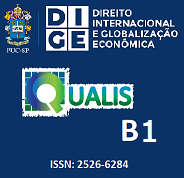Tutela inibitória como instrumento de efetividade do direito ao acesso à justiça em tempos de pandemia
DOI:
https://doi.org/10.23925/2526-6284/2022.v9n9.59098Parole chiave:
Inhibitory protection. Right of action. Differentiated jurisdictional protection. Pandemic.Abstract
Objetivo: o presente artigo científico tem como finalidade abordar o cenário excepcional imposto pela pandemia decorrente do vírus SarsCov2 – COVID-19 e seus desdobramentos, dos quais decorrem alterações na vida dos cidadãos em relação aos direitos de personalidade, como, por exemplo, a liberdade de ir e vir, o direito à informação e o direito do consumidor, entre outros, em confronto com direitos coletivos para salvaguardar a saúde, como bem primordial da sociedade, por ser um dos elementos que integram o Estado: o território, a soberania e o povo (quiçá vivo).
Metodologia: a metodologia de pesquisa utilizada foi a jurídica-teórica, por meio do raciocínio empírico-dedutivo e da observação da realidade social, estudos do ordenamento jurídico, material bibliográfico doutrinário e jurisprudencial.
Resultados: os resultados obtidos foram respectivamente (i) a necessidade de reflexão e fomento das normas constitucionais para salvaguardar o Estado Democrático de Direito consagrado na Constituição; (ii) a defesa do direitos e garantias do indivíduo, (iii) os direitos da personalidade e outros referenciados; (iv ) a utilização de tutelas inibitórias individuais e coletivas para atingir este mister. E, por fim, de forma sintética, concluiu-se que a tutela inibitório é um meio eficaz para tornar direitos efetivos, principalmente no contexto excepcional imposto pela pandemia.
Contribuições: a contribuição científica almejada é, inicialmente, fomentar o debate sobre os meios de efetivação da tutela jurisdicional na defesa de Direitos materiais, difusos, coletivos e individuais homogêneos, sobre os quais não há a possibilidade de quantificar os danos, em sendo lesionados, por suas características imanentes não patrimoniais e, em um segundo momento, revisar institutos de Direito processual, como as tutelas preventivas, e, em especial, a tutela inibitória, aqui tratada, como meio de salvaguarda desses direitos.
Palavras-Chave: Tutela inibitória. Direito de ação. Tutela jurisdicional diferenciada. Pandemia.
Riferimenti bibliografici
ARENHART, S. C. Perfis da tutela inibitória coletiva. São Paulo: Revista dos Tribunais, 2003.
ARRUDA ALVIM, E. Direito processual civil. 5th ed. São Paulo: Revista dos Tribunais, 2013a.
ARRUDA ALVIM, E. Direito processual civil. 5th ed. São Paulo: Revista dos Tribunais, 2013b.
ARRUDA ALVIM, M. Manual de direito processual civil. 15th ed. São Paulo: Revista dos Tribunais, 2012.
ÁVILA, H. Teoria dos princípios: da definição à aplicação dos princípios jurídicos. 4th ed. São Paulo: Malheiros, 2005.
BRASIL. Esclarecimento sobre decisões do STF a respeito do papel da União, dos estados e dos municípios na pandemia (2021). Portal do STJ. Available at: https://portal.stf.jus.br/noticias/verNoticiaDetalhe.asp?idConteudo=458810&ori=1#:~:text=Na%20verdade%2C%20o%20Plen%C3%A1rio%20decidiu,do%20STF%20em%20diversas%20ocasi%C3%B5es. Access on: 15th Feb. 2021.
BRASIL. Lewandowski determina que governo federal forneça oxigênio e insumos a hospitais de Manaus (AM) (2021a). Portal do STJ. Available at: http://portal.stf.jus.br/noticias/verNoticiaDetalhe.asp?idConteudo=458724&ori=1. Access on: 15th Fev. 2021.
CAPPELLETTI, M.; GARTH, B. Acesso à Justiça. Porto Alegre: Sérgio Antônio Fabris, 2002.
DINARMARCO, C. R. A instrumentalidade do processo. 15th ed. São Paulo: Malheiros, 2013.
EMPOLI, G. DA. Os Engenheiros do Caos. São Paulo: Vestígio, 2019.
FRIGNANI, A. L’azione inibitoria contro le clausole vessatorie: (considerazioni “fuori dal coro” di un civilista). 52. ed. Pádova: Cedam, 1997.
LOPES, J. B. Tutela Antecipada no processo civil brasilekiro (de acordo com o novo CPC). 5th ed. São Paulo: Castro Lopes, 2016.
LOPES, J. B. Modelo constitucional de processo: uma “antiga novidade”. In: Reflexões sobre o Código de Processo Civil de 2015: uma contribuição dos membros do Centro de Estudos Avançados de Processo - Ceapro. São Paulo: Verbatim, 2018a.
LOPES, J. B. Tutela Inibitória. In: Tutela provisória: tutela antecipada; tutela cautelar; tutela de evidência; tutela inibitória anttecipada.
LOPES, J. B. Tutela Inibitória. Enciclopédia Jurídica da Pontifícia Universidade Católica de São Paulol, 2019.
MARINONI, L. G. Garantia da tempestividade da tutela jurisdicional e do duplo grau de jurisdição. In: CRUZ E TUCCI, J. R. (Coord.). Garantias constitucionais do processo civil. São Paulo: Revista dos Tribunais, 1999.
MEDINA, J. G.; MONTESCHIO, H. Processo e Instrumentalidade: boas práticas de solução de conflitos e proteção de direitos fundamentais. 1st ed. Florianópolis: Qualis Editora, 2020. v. 110
NERY JÚNIOR, N. Princípios do processo na Constituição Federal. 10th ed. São Paul2009o: Revista dos Tribunais, 2009.
NUNES, D.; TEIXEIRA, L. Acesso à Justiça democrático. Brasília: Gazeta Jurídica, 2013.
RAPISARDA, C. Profili della tutela civile inibitoria. Pádova: Cedam, 1987.
SILVA, B. C. Sistematização da tutela inibitória e o Código de Processo Civil. Pontifícia Universidade Católica de São Paulo, 2018.
SILVA, C. DO C. E. Tutela Preventiva. Digesto de Processo. V. 5 Prova/Valor da Causa. Rio de Janeiro: Forense, 1988.
SILVA, P. E. A. DA. Tutela inibitória e atuação jurisdicional preventiva. Universidade de São Paulo, 2003.
SILVA, V. F. S. DA. A ineficácia da sentença inconstitucional. 1st. ed. São Paulo: Dialética, 2020.
SOARES, R. A. M. Tutela jurisdicional diferenciada: tutellas de urgência e medidas liminares em geral. São Paulo: Malheiros, 2000.




